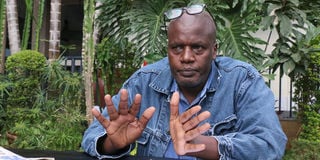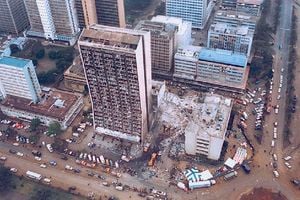
Peter Mwaura, a survivor of both the August 1998 bombing of the US embassy in Kenya and the September 11, 2001 attacks on the Twin Towers in the US.
On August 7, 1998, Peter Mwaura visited the US Embassy in Nairobi to rectify a mistake on his student visa.
After consulting with his family, he sought clarification to avoid any last-minute issues, noting that his visa read "KENY" instead of "KENYAN."
The then 24-year-old Mwaura who lived in Nairobi's Riruta area woke up at 5 am and boarded an early bus to town to avoid long queues.
By 9am, he walked towards the embassy and found a queue of more than 150 people, stretching outside the Co-operative Bank of Kenya building.
Mwaura bought a newspaper to pass the time but soon approached the reception directly to confirm if the typo would affect his travel.
Despite the event having happened 26 years ago, he recalls being stopped by two armed marine soldiers at the entrance, asking him why he had jumped the queue. After explaining the mistake on his passport, they assured him that his visa was fine.
A satisfied Mwaura then left the building and headed towards the bus station.
However, upon reaching Afya House, a loud bang went off behind him.
People screamed
"I saw dark smoke and papers flying in the sky. Alarms sounded and vehicles hooted as people screamed and ran everywhere. There were also ambulances arriving and helicopters hovered over the CBD. Little did I know that a story that would dominate local and global news for weeks and months was unfolding right in front of me," Mwaura recalled in an interview with Nation. Africa in Nakuru where he resides.
Unknown to him, he had narrowly escaped death as the US Embassy had been bombed, killing over 200 people and injuring 5,000.
In the chaos, Mwaura made his way out of the city centre, stopping at a hotel in Hurlingham where he saw the breaking news: "US Embassy Bombed".
"I couldn't believe it. The building I had just left was in flames. On TV, we saw security agents pulling the late Minister JJ Kamotho and US Ambassador Prudence Bushnell out of the Co-operative Bank Building and many others. Bodies were being removed from the rubbles,” he recalled.
“I also recall seeing a white van driver pleading with security officers to give him access to the Embassy basement parking. I just walked past, leaving the van driver arguing, and went through the main entrance. To date, I do not know if he was allowed,” he added.
Weeks later, Mwaura flew to Manhattan College in Bronx, New York, graduating in 2001.
He applied for a job in the project management team at the Twin Towers in Manhattan's CBD, but repeated postponements led him to accept a position at Cable Vision Incorporated in Hicksville, Long Island.
According to Mwaura, he could board train number 1/9 from Riverdale in the Bronx to CBD and change trains at Twin Towers to the one plying 1 hour to Ronkokoma, a few minutes before Hicksville.
On September 10, 2001, Mr Mwaura commuted to work as usual for the night shift, via the two trains from Bronx to Ronkokoma, spending the entire night in the office with colleagues’ consultants till the next day.
He said that as usual, he travelled back home past the Twin Towers underground railroad and central station.
However, upon reaching home, his landlord called to confirm whether he was back home safely.
Twin Towers bombed
After further inquiring what was happening, the landlord asked him to switch on his television where he learned that the Twin Towers had been bombed.
Now a 50-year-old private sector IT expert, Mwaura often visits the memorial park at the former embassy site in Nairobi with his family, to remember the deadly attack.
He shared that surviving both the embassy and Twin Towers attacks left him traumatised. He underwent two years of counselling for emotional and psychological scars.
Mwaura now lives by the Bible verse Isaiah 41:10: "So do not fear, for I am with you; do not be dismayed, for I am your God. I will strengthen you and help you; I will uphold you with my righteous right hand."
Reflecting on his survival, Mwaura says: "Though I was not physically hurt, the trauma remains. It was God's miracle that I escaped both attacks. I believe He had plans for me, and this has deepened my relationship with Him."
When asked why he had come out to talk about the incident 26 years later, Mr Mwaura said that the two incidents left him traumatised and he could only narrate the story to his children and close friends.
He hopes that the government of the US will compensate Kenyans whose attack impacted their lives forever, who lost their loved ones, and who were permanently disabled as the 26th anniversary is marked next week.
"I am among those who survived the ugly attack to tell the story. We just hope all the victims will be compensated," he said.








